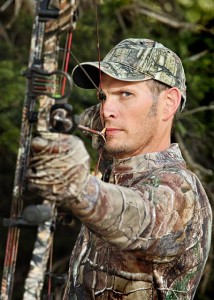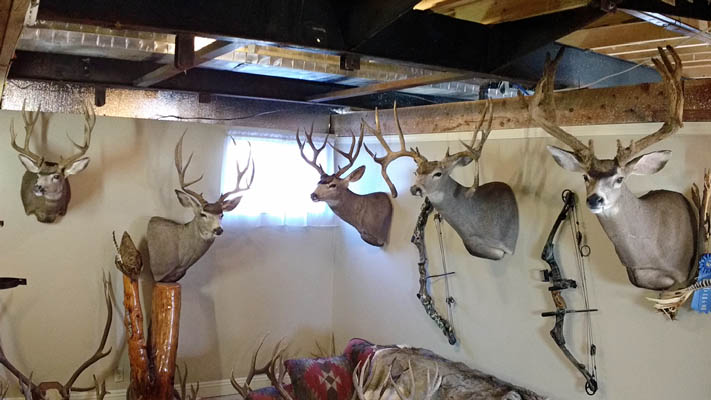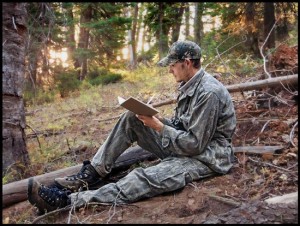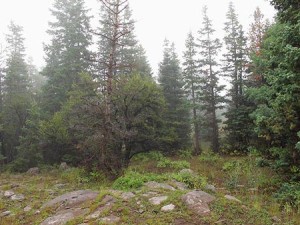The Quest for “Big 5”
I never felt so tired! It was 4:30am on the nineteenth morning of my Utah bow hunt. Whenever I lied down to sleep my mind swirled with strategies to outsmart the giant, velvet-clad buck I called “Big 5.” But he always managed to stay one step ahead of me.
I spotted Big 5 on the fourth day of the deer hunt. He was feeding in a thick, oak brush-covered hillside, and I raced to get ahead of him in the fading evening light. Just as I was closing in, the wind shifted and blew him out of the canyon. I spent the next week searching surrounding canyons and exploring other parts of the unit, but couldn’t turn him up. Although I saw plenty of other bucks, none compared to the amazing Big 5. At that point I decided to devote the rest of the season to hunting this one buck.

Just before dark on the twelfth day, Big 5 reappeared in the canyon where I first saw him. There wasn’t enough light for a stalk, but I returned to camp with newfound hope.
My mind buzzed with excitement as I lied in bed anticipating the morning stalk. But wouldn’t you know it, over night a great herd of elk moved in and pushed all the deer out. I spent the next three days searching for him, but to no avail.
The Return of Big 5
During this time I joined forces with two elk hunters—Brian and Mike—who were hunting in the same general area. We had an agreement: I would keep tabs on any big bulls, and they would keep an eye out for Big 5.
Just when I was beginning to lose hope, Mike spotted Big 5 crossing into the canyon at dark on the fourteenth evening. The next morning I sneaked into the deer’s primary feeding area, but ended up busting him out again while still-hunting through the thick and noisy oak brush. This was the lowest point of my hunt.
Bowhunting is a low-odds venture to begin with; things don’t work out most of the time. As a rule, bowhunting success comes from having multiple opportunities, and the fastest way to limit your success is by hunting for one deer exclusively.

To keep hope alive, I wrote a list of positive affirmations in my hunt journal. Of particular note was a reminder that not only do I have 27 years of bowhunting experience under my belt, but I’ve been down this road before: Hunting for just one deer. Only this time was different. I didn’t have three years to get the job done!
The Tank Buck
Hope returned on day 16 when I discovered a new buck—a massive, old, wide-racked 4×4 I called the “Tank”—in an adjacent canyon. He wasn’t as impressive as Big 5, but the longer I watched him the more I fell in love. He was a magnificent deer, and if nothing else he served as a good backup. The season was half-way over after all, so I was relieved to have another target on my very short list.

So you can imagine my disappointment when, the very next morning, I found that Tank and Big 5 had joined forces! They were now feeding together—along with a few smaller bucks—in the bottom of the canyon where it all started. And just like that, all my eggs were in one basket: Bust one, bust ‘em all.
Desperate to make a stalk, I threw down my glass, picked up my bow and scrambled to the bottom of the steep, aspen-choked canyon. But just as I was closing in, the wind changed and blew one of the smaller bucks out of his bed. I turned and backed out immediately to avoid further damage.

The next morning, in complete darkness, I snuck to the bottom of the canyon hoping to get in front of the bucks before first light. But once again my plans were foiled when I glassed up the bucks feeding at the top of the canyon! As morning dragged on, the bucks side-hilled out of view and disappeared. Once again they stayed one step ahead of me.
Endless Pursuit
By day nineteen I was at wits end. At some point during the restless night I hatched a plan to get ahead of the bucks. I knew from experience that big bucks get big by being unpredictable. So if they fed at the top of the canyon yesterday, perhaps they’d be at the bottom today. Again, in the cover of darkness I dropped down the canyon. And wouldn’t you know it, the bucks stayed high! This time, however, I wasn’t letting them out of my sight.
Immediately I ascended the aspen ridge between us, and then watched as all three deer—Big 5, Tank, and a smaller 3-point—fed along the ridge top and eventually bedded beneath a couple big pine trees. I pulled out my notebook and drew a diagram of the bedding area, noting landmarks that I could use during the stalk. But first I’d have to wait for the thermals to stabilize.

I returned to camp and was just about crawling out of my skin waiting for the south winds to prevail. Finally, at noon I set out on a low-odds stalk towards the bucks, knowing that one false move could blow the bucks out forever. Surely they were growing weary of my chase.

The Final Stalk
The midday sun beat down on my face as I crested the ridge fifty yards above the bedded bucks, but thick oak brush obscured my view. Must get closer.
Hot, south crosswinds carry away my scent and the sound of my footsteps amongst the loose gravel on the hillside that grows steeper with each step. A frightened chipmunk shrieks and scurries away. I freeze for a minute, then take a range from the lower limbs of one of the trees: 45 yards. I slowly load an arrow and continue forward. Everything must be perfect now.
Each footstep is timed with the occasional gust of wind or the raspy sound of flying grasshoppers. I take another range: 35 yards. I wince as the wind continually dips down, then rises again. My heart-beat quickens; sweat beads up across my face. I take another step and look up again. Fuzzy antlers are suddenly bobbing through the oak brush. Big 5 is up and feeding, but only his head is visible.
I slowly raise my bow and scan ahead for a shot window. The situation unfolds in strange contrast: the natural world flows lazily along, but my mind is frantic as I try to manage a myriad of details in a heightened state of awareness. I’ve been here before; I know the odds. “What happens next? How does this end?”
The buck slowly feeds towards a little, two-foot gap in the oak brush. It’s all a blur as I draw my bow and track the buck with my 30-yard pin. He finally steps through and my arrow is off. There’s an audible “thunk,” and then pandemonium as all three bucks explode down the mountain. Seventy yards out, Tank and the smaller buck regroup and look back, but Big 5 continues out of sight.
Twenty minutes later I begin tracking down the mountainside. There’s blood right away, and for the first time in weeks I feel a sense of relief. A little further down the canyon and there he is. In my haste to shoot, the arrow hit forward in the neck, but did the job.

Like a dream, I reach down and grasp the buck’s sprawling antlers in my hands. I feel strangely numb. Whatever elation I’m supposed to feel has been cancelled out by the rigors of mountain, dampened by loss of sleep, and swamped in disbelief. Sometimes a hunter gets lucky; other times he earns it. In this case, the only luck I had was seeing the buck in the first place. I gave this hunt everything I had; I paid full price for my trophy.
Final Thought
Long ago, in a personal attack fueled by jealousy, an old “friend” once said to me, “I don’t have to shoot the biggest deer on the mountain to prove I’m a man!” I don’t disagree, however it does prove other things: That you have a special skill set; that you are a provider of meat; and above all, you are the top predator you were meant to be. And that, my friends, puts you one step ahead of the rest.














